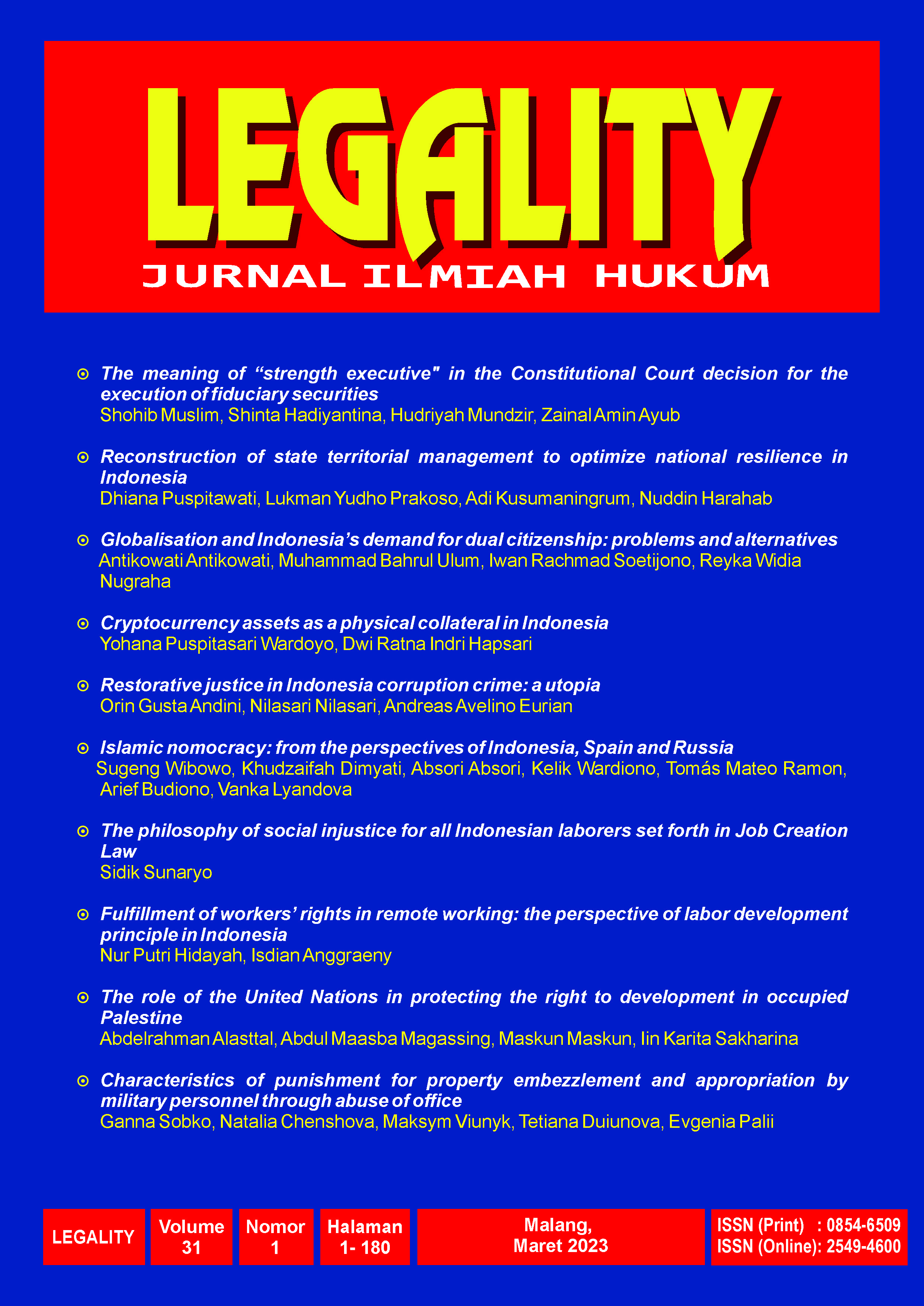Characteristics of punishment for property embezzlement and appropriation by military personnel through abuse of office
DOI:
https://doi.org/10.22219/ljih.v31i1.25933Keywords:
embezzlement, appropriation, military property, military personnel, corruptionAbstract
The article is focused on the analysis of legislative regulation of sentencing and exemption from punishment of persons who have committed criminal offenses connected with the appropriation and embezzlement of military property by military personnel through the abuse of official position. The variability of responsibility for the appropriation and embezzlement of military property was analyzed, beginning with the Criminal Code of 1960, the effective Criminal Code of 2001, and the draft of new criminal legislation on this criminal offense. This study employed a comparative legal analysis of responsibility according to administrative and criminal legislation, defines the level of punishment for the committed offenses, and presents. The author’s classification of disciplinary, administrative, and criminal responsibility. Criminal offenses related to corruption were also analyzed and the restrictions that cannot be applied to persons who have committed corruption offenses were investigated. This study also proposes a list of corrupt criminal offenses, explores possibilities for mitigating criminal liability for persons who have committed corruption criminal offenses that would not exceed the ban on mitigating criminal responsibility for corruption offenses, and considers the possibility of imposing additional types of punishment to persons who have committed criminal offenses in the area of the appropriation and embezzlement of military property. Statistical data on administrative and criminal proceedings on this issue were analyzed.
Downloads
References
Indonesia Military Strength. (2023). Retrieved from https://www.globalfirepower.com/country-military-strength-detail.php?country_id=Indonesia.
Achmad, R. (2017). Hakekat Keberadaan Sanksi Pidana Dan Pemidanaan Dalam Sistem Hukum Pidana. Legalitas: Jurnal Hukum, 5(2), 79–104. https://doi.org/10.33087/legalitas.v5i2.98
Alon Margalit. (2018). Civilian Oversight of Military Investigations. In Investigating Civilian Casualties in Time of Armed Conflict and Belligerent Occupation (pp. 207–224). Brill | Nijhoff. https://doi.org/10.1163/9789004368217_009
Armed Forces of Indonesia. (2023). Retrieved from: https://tni.mil.id.
Armed Forces of Thailand. (2023). Retrieved from https://web.archive.org/web/20140604082705/http://rtarf.mi.th/index_new.html.
Britchenko, I., & Saienko, V. (2017). THE PERCEPTION MOVEMENT ECONOMY OF UKRAINE TO BUSINESS. Economic Studies, 26(4), 163–181.
Code of Ukraine on Administrative Offenses. (2022). Retrieved from https://zakon.rada.gov.ua/laws/show/80731-10#Text.
Criminal Code of Ukraine. (2001). No. 25-26. https://zakon.rada.gov.ua/laws/show/2341-14#Text
Criminal Code of Ukraine (project). (2022). Control Text. https://newcriminalcode.org.ua/upload/media/2022/09/29/1-kontrolnyj-tekst-proektu-kk-29-09-2022.pdf
Effron, J. A. S., & Wroblewski, J. J. (2022). Congress Reforms Military Sentencing, Creating an Opportunity for a Productive Sentencing Reform Dialogue Between the Military and Civilian Criminal Justice Systems. Federal Sentencing Reporter, 35(1), 73–85. https://doi.org/10.1525/fsr.2022.35.1.73
Fesenko, E. F. & Fesenko, Y. E. (2001). Criminal Codes of Ukraine 2001 and 1960: comparative tables. Кyiv: Istyna, 272.
Gaggioli, G. (2018). International Humanitarian Law: The legal framework for humanitarian forensic action. Forensic Science International, 282, 184–194. https://doi.org/10.1016/j.forsciint.2017.10.035
Heller, K. J. (2019). International crime. In Concepts for International Law. Edward Elgar Publishing. https://doi.org/10.4337/9781783474684.00038
Honcharuk, A. Z., Drobotyuk, O. V., Kiktenko, V. O., Musiichuk, V. A., & Fil, Y. S. (Eds.). (2021). Ukraine and the Countries of East, Southeast and South Asia: 2020 Results and Development Prospects. Kyiv: National Institute of Strategic Studies.
Jöbstl, H. (2020). Bridging the Accountability Gap: Armed Non-state Actors and the Investigation and Prosecution of War Crimes. Journal of International Criminal Justice, 18(3), 567–597. https://doi.org/10.1093/jicj/mqaa026
Joll, C. M. (2010). Religion and conflict in Southern Thailand: Beyond rounding up the usual suspects. Contemporary Southeast Asia: A Journal of International and Strategic Affairs, 32(2), 258–279.
Judicial Power of Ukraine. (2021). Retrieved from https://court.gov.ua/inshe/sudova_statystyka/zvitnist_21.
Lavrentieva, O., Pererva, V., Krupskуi, O., Britchenko, I., & Shabanov, S. (2020). Issues of shaping the students’ professional and terminological competence in science area of expertise in the sustainable development era. E3S Web of Conferences, 166, 10031. https://doi.org/10.1051/e3sconf/202016610031
Law of Malaysia No 77 “Armed forced act 1972.” (2006). Retrieved from https://www.legal-tools.org/doc/cce7ca/pdf/.
Law of Ukraine No. 1698-VII. (2014). On the National Anti-Corruption Bureau of Ukraine. https://zakon.rada.gov.ua/laws/show/1698-18#Text
Law of Ukraine No. 47. (2014). On the National Anti-Corruption Bureau of Ukraine. https://zakon.rada.gov.ua/laws/show/1698-18#n336
Lee, K. Y. (2011). Singapore History: From the Third World to the First. Kyiv: Nash Format.
Levchenko, I., Dmytriieva, O., Shevchenko, I., Britchenko, I., Kruhlov, V., Avanesova, N., Kudriavtseva, O., & Solodovnik, O. (2021). Development of a method for selected financing of scientific and educational institutions through targeted capital investment in the development of innovative technologies. Eastern-European Journal of Enterprise Technologies, 3(13 (111)), 55–62. https://doi.org/10.15587/1729-4061.2021.235930
Ministry of Defense of Malaysia. (2023). Retrieved from https://www.mod.gov.my/ms/.
Notoprojo, A. A., Al-Fatih, S., & Haruni, C. Wi. (2022). Analisis Putusan No.39/Pid.B/2015/PN/Sit Dalam Perkara Tindak Pidana Pembalakan Liar Ditinjau Dari Aspek Keadilan. Indonesia Law Reform Journal, 2(2), 206–221. https://doi.org/10.22219/ilrej.v2i2.22262
On Amendments to Certain Legislative Acts of Ukraine Regarding Ensuring the Activities of the National Anti-Corruption Bureau of Ukraine and the National Agency for the Prevention of Corruption. (2015). The Law of Ukraine No. 17, Article 118. https://zakon.rada.gov.ua/laws/show/198-19#n27
On Amendments to the Code of Ukraine on Administrative Offenses the Criminal Code of Ukraine on Improving Liability for Declaring Unreliable Information and Failure to Submit a Declaration by the Subject of the Declaration of a Person Authorized to Perfo. (2021). Law of Ukraine No. 1576-IX. https://zakon.rada.gov.ua/laws/show/1576-20#n16
On the Disciplinary Regulations of the Armed Forces of Ukraine. (2022). Law of Ukraine No. 22-23, Article 197. https://zakon.rada.gov.ua/laws/show/551-14#Text
Osiejewicz, J. (2018). Audiatur et altera pars: w kwestii realizacji zadañ służby geologicznej–odpowiedź na polemikę. Przegląd Geologiczny, 66(10), 628.
Osiejewicz, J. (2020). Transnational Legal Communication: Towards Comprehensible and Consistent Law. Foundations of Science, 25(2), 441–475. https://doi.org/10.1007/s10699-020-09655-3
Saputra, F. (2020). Peranan Lembaga Pemasyarakatan dalam Proses Penegakan Hukum Pidana Dihubungkan dengan Tujuan Pemidanaan. REUSAM: Jurnal Ilmu Hukum, 8(1), 1. https://doi.org/10.29103/reusam.v8i1.2604
Schenck, L., & Schlueter, D. A. (2020). (American Military Justice: Retaining the Commander’s Authority to Enforce Discipline and Justice). SSRN Electronic Journal. https://doi.org/10.2139/ssrn.3666595
Shambaugh, D. (2018). U.S.-China Rivalry in Southeast Asia: Power Shift or Competitive Coexistence? International Security, 42(4), 85–127. https://doi.org/10.1162/isec_a_00314
Shilin, A. (2022). The Military in Indonesian Politics. https://web.archive.org/web/20110806015245/http://mdb.cast.ru/mdb/5-2002/dp/mip/?form=print
Simmons, C. (2021). The Scope of Military Jurisdiction for Violations of International Humanitarian Law. Israel Law Review, 54(1), 3–23. https://doi.org/10.1017/S0021223720000217
Singapore Government Agency. (2023). Retrieved from https://www.mindef.gov.sg/web/portal/mindef/home.
Zhang, S., & Liu, X. (2019). The roles of international tourism and renewable energy in environment: New evidence from Asian countries. Renewable Energy, 139, 385–394. https://doi.org/10.1016/j.renene.2019.02.046
Downloads
Published
How to Cite
Issue
Section
License
Copyright (c) 2023 Ganna Sobko, Natalia Chenshova, Maksym Viunyk, Tetiana Duiunova, Evgenia Palii

This work is licensed under a Creative Commons Attribution-ShareAlike 4.0 International License.










